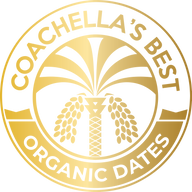Celebrate Ramadan with Coachella’s Best Organic Dates
Mar 18, 2022
It’s almost that time of year again, Ramadan is right around the corner! This is the perfect moment to learn all about this significant Islamic holiday and how dates play a big role during this time.
What is Ramadan?
Ramadan is a holy month for Muslims, followers of Islam. It is celebrated during the 9th month of the 12-month Islamic calendar. During this time the Prophet Muhammad received the Qur’an, Islam’s holy book, from God. The specific night this occurred usually lands on the 27th night and is referred to as the “Night of Power.” This night is significant because the Qur’an gives “guidance for the people.”
Ramadan is a time for Muslims to focus on introspection, fasting, and praying. Every day during Ramadan, Muslims do not eat or drink anything from dawn to dusk. After the prayer at sunset, everyone gathers with their extended family and friends in their homes or mosques to break their fast and enjoy a meal together. During the fast, they also refrain from impure or hateful thoughts and words as well as sinful behavior such as smoking. People who are sick, elderly, traveling, pregnant, or nursing that is not able to fast during this time can either fast at a later time or help feed the poor in lieu of fasting. Overall, Ramadan is a time to practice self-restraint as well as for introspection, reading the Qur’an, and communal prayer.
The end of Ramadan is known as Eid al-Fitr or the “Feast of Fast-Breaking.” This three-day festival is one of Islam’s biggest holidays. During this time everyone dresses their best, gathers with family to eat, exchanges gifts, and visits the graves of their loved ones. They also gather in mosques to pray together and celebrate the end of fasting!
Why are dates significant?
The Prophet Muhammad once stated, “When one of you is fasting, he should break his fast with dates; but if he cannot get any, then (he should break his fast) with water, for water is purifying.” On top of this, dates are also mentioned more than 20 times throughout the Qur’an as they are an important part of Islam.
While dates are significant to Muslims and Ramadan specifically, there is a good reason for it. The meal that is eaten before the sun rises is called Suhoor. Dates are the perfect fruits to enjoy for Suhoor because the sugar gives your body the energy it needs to get through the day and the fiber keeps you full longer. The meal after the sun sets is called Iftar. It is a tradition to eat dates for Iftar in order to follow the Prophet Muhammad’s words of breaking your fast with dates. Consuming dates after fasting can help your blood glucose levels return to normal and provide you with a great source of magnesium, potassium, iron, and phytonutrients!
Make sure you are fully stocked with your favorite Organic Dates this Ramadan by shopping our bulk boxes! Click HERE to get your Coachella’s Best Organic Dates today!


